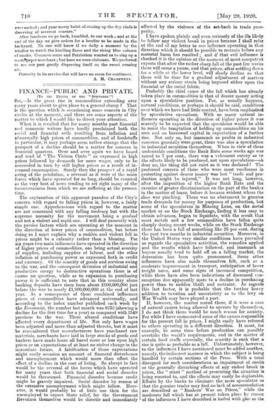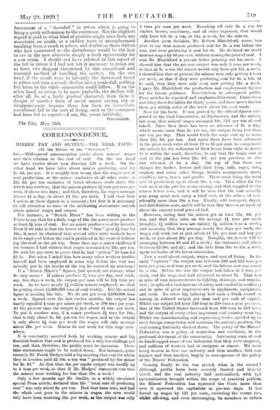FINANCE—PUBLIC AND PRIVATE.
[To THE EDITOR or THE " SPECTATOR.'
BIR,--43 the great rise in commodities extending over many years about to give place to a general slump ? That is the question which is occasioning some concern in City circles at the moment, and there are some aspects of the matter to which I would like to direct your attention.
When it is recalled that for many months past financial and economic writers have loudly proclaimed both the social and financial evils resulting from inflation and abnormally high prices of commodities, and of foodstuffs in particular, it may perhaps seem rather strange that the prospect of a decline should be a matter for concern in financial quarters. Over and over again we have heard and read of " The Vicious Circle " as expressed in high prices followed by demands for more wages, only to be succeeded in turn by still higher prices as a result of in- creased consumption. Surely then the prospect of a rapid swing of the pendulum, a reversal as it were of the main forces which have operated for so long, should be counted as the very best of news tending to set right many of the inconveniences from which we are suffering at the present time.
The explanation of this apparent paradox of the City's concern with regard to falling prices is, however, a fairly simple one. Apprehensions with regard to the matter are not concerned with any falling tendency but with the supreme necessity for the movement being a gradual and not a violent and rapid one. I will deal presently with the precise factors which are operating at the moment in the direction of lower prices of commodities, but before doing so I must explain why a sudden and violent fall in prices might be a calamity rather than a blessing. For six years two main influences have operated in the direction of higher prices of commodities, one being actual scarcity of supplies, including supplies of labour, and the other inflation of purchasing power as expressed both in credit and currency. Of the scarcity of goods and services owing to the war, and the consequent diversion of industrial and productive energy to destructive operations there is of course no question, while as to expansion in purchasing power it is sufficient to note that in this country alone banking deposits have risen from about £800,000,000 just before the war to nearly 11,900,000,000 at the end of last year. As a consequence of these combined influences prices of commodities have advanced universally, and according to the index number published each week by the Economist, the number last month was 8232 (showing a decline for the first time for a year) as compared with 2549 previous to the war. These altered conditions have affected every department of life. Not only have wages been adjusted and more than adjusted thereto, but it must be remembered that manufacturers have purchased raw materials, merchants have laid in large stocks of goods and bankers have made loans all based more or less upon high prices or on expectations of at least no violent change in the immediate future. A falsification of those expectations might easily occasion an amount of financial disturbance and unemployment which would more than offset the effect of a decline in the cost of living. So abrupt in fact would be the reversal of the forces which have operated for many years that both financial and social disorder would be threatened. Financial disorder because credit might be gravely impaired. Social disorder by reason of the extensive unemployment which might follow. More- over, it would probably be of little use then for the unemployed to expect State relief, for the Government Revenues themselves would be directly and immediately affected by the violence of the set-back in trade pros- perity.
I have spoken plainly and even seriously of the ills likely to follow any violent break in prices because I shall refer at the end of my letter to one influence operating in that direction which it should be possible to restrain before any material harm has resulted ; and if that evil influence is i checked it is the opinion at the moment of most competent experts that after the rather sharp fall of the past few weeks there will come a pause, and that prices, after settling down for a while at the lower level, will slowly decline so that there will be time for a gradual adjustment of matters without any serious strain being imposed either upon the financial or the social fabric.
Probably the chief cause of the fall which has already taken place in commodities is that of dearer money acting upon a speculative position. For, as usually happens, natural conditions, or perhaps it should be said, conditions over which we have had little control, have been emphasized by speculative operations. With so many natural in- fluences operating in the direction of higher prices it was scarcely to be expected that the speculator would be able to resist the temptation of holding up commodities on his own and on borrowed capital in expectation of a further rise. Not only so, but inasmuch as profits in industrial concerns generally were great, there was also a speculation in industrial securities themselves. When in view of these undesirable conditions the Bank Rate some weeks ago was raised to 7 per cent., there was a vehement outcry as to the effects likely to be produced, not upon speculation—oh dear no, the thing did not exist so it was declared ! The professed concern of those who were most vociferous in protesting against dearer money was lest " trade and pro- duction might be injured." It was not long, however, after the imposition of the higher Bank Rate and the exercise of greater discrimination on the part of the banker in the matter of loans, before it became evident where the shoe was pinching. There was no abatement in genuine trade demands for money for purposes of production, but some of the speculators in Mincing Lane, on the metal market or on the Stock Exchange, finding it less easy to obtain advances, began to liquidate, with the result that most metals and a few commodities have fallen quite sharply during recent weeks, while on the Stock Exchange there has been a fall of something like 25 per cent. during the past two months in industrial securities. Moreover, in the United States very similar conditions have prevailed' as regards the speculative activities, the remedies applied and the results which have followed, and inasmuch as buyers usually tend to hold off on a falling market, the depression has been quite pronounced. Some other influences have also made themselves felt, such as a moderate improvement in transport, anticipation of lower freight rates, and some signs of increased competition, while there have also been indications of decreased con- sumption due apparently more to a decline in purchasing power than to sudden thrift and restraint. As regards this last factor, it is probable that the further heavy addition to taxation and uncertainty as to the levy on War Wealth may have played a part. If, however, the matter rested there, if it were a case of natural causes being allowed to operate by themselves, I do not think there would be much reason for anxiety. For while I have enumerated some of the causes responsible for the present fall in prices, I might easily have referred to others operating in a different direction. It must, for example, be some time before production can possibly overtake the world's requirements, and in the matter of certain food stuffs especially, the scarcity is such that a rise is quite as probable as a fall. Unfortunately, however, to the influences I have mentioned must be added another, namely, the indiscreet manner in which the subject is being handled by certain sections of the Press. With a total disregard for such considerations as impairment of credit or the generally disturbing effects of any violent break in prices, the " stunt " method of presenting the situation is being resorted to, and the effects may easily be deplorable. Efforts by the banks to eliminate the mere speculator so that the genuine trader may find no lack of accommodation are described as " Bankers' War on Prices," while the moderate fall which has at present taken place by reason of the influences I have described is hailed with glee as the forerunner of a " downfall " in prices which is going to bring a quick millennium to the consumer. Not the slightest regard is paid to what kind of position might arise from any overstrain on credit, or a sudden wave of unemployment resulting from a crash in prices, and doubtless those writers who had ministered to the disturbance would be the first to see in the new situation simply a fresh opportunity for a new stunt. I should not have referred to this aspect of the fail in prices if I had not felt it necessary to point out at least two dangers threatened by this sensational and unsound method of handling the matter. On the one hand, if the result were to intensify the downward trend in prices and turn a steady decline into a panic-fall, nothing but harm to the whole community could follow. If on the other hand, as seems to be more probable, the decline will, after all, be of a fairly gradual character, then there is danger of another form of social unrest arising out of disappointment because there has been no immediate sensational fall in the cost of living, such as the consumer had been led to expect.-I am, Sir, yours faithfully, The City, May 25th.
ONLOOKER.







































 Previous page
Previous page